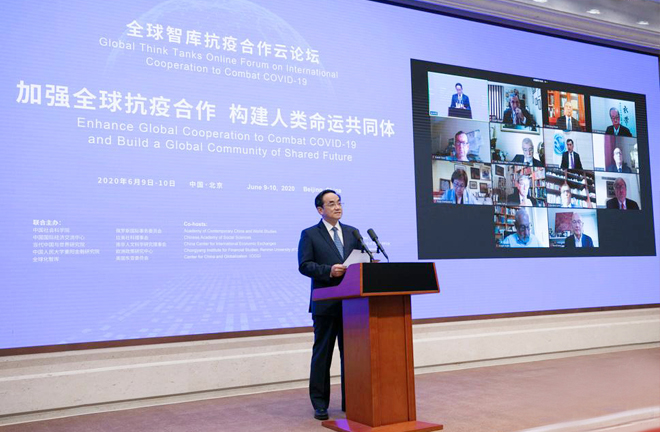Webinar calls for greater global cooperation against pandemic

Experts exchange ideas at the webinar on June 9 and 10. Photo: CHINA.ORG.CN
At the Global Think Tanks Online Forum on International Cooperation to Combat COVID-19 on June 9 and 10, experts called for greater global collaboration and coordination to curb the COVID-19 pandemic.
More than 160 representatives of think tanks and the media from 48 countries and nine international organizations exchanged ideas online.
Xie Fuzhan, president of the Chinese Academy of Social Sciences, presided over the opening ceremony of the webinar. He pointed out that this webinar reflects the will and determination of the think tanks of various countries to strengthen cooperation and meet challenges in the face of the pandemic. It is of great significance for experts, scholars and media professionals to analyze the challenges, share their anti-pandemic experience, advocate for solidarity and cooperation, and propose countermeasures.
Xie expressed his hope that experts and scholars have frank and in-depth communication and that they contribute wisdom and strength so as to boost international anti-pandemic cooperation, maintain global public health security, vitalize economic and social development, and promote the building of a community of shared future for mankind.
Former Japanese Prime Minister Yasuo Fukuda emphasized the importance of the concept of a community of shared future for mankind. In the face of the challenges raised by the pandemic, we must uphold international cooperation and support the United Nations and the World Health Organization playing a leading role in global public health governance.
Former Croatian President Stjepan Mesic thanked China for its unremitting efforts to fight the pandemic and promote global cooperation. He called for strengthening global governance, solidarity and cooperation. He expressed his hope that leaders of various countries care about the shared future of mankind as much as their own countries and abandon the anti-globalization and deglobalization mindset.
People’s health is essential to economic growth, said Joseph Stiglitz, a professor at Columbia University and a Nobel laureate in economics. Only by successful control of the global pandemic can the world economy recover from its fallout. When responding to its economic impact, the liquidity support provided by central banks is crucial. However, liquidity support cannot replace strong financial support. Carefully formulated financial support policies are conducive to building a green economic model while curbing the pandemic.
Participants from Egypt, Russia, Kyrgyzstan, Slovenia and the Shanghai Cooperation Organization said that China’s assistance to many countries is a model of solidarity. All countries should uphold the concept of a community of shared future for mankind and join hands in fighting the pandemic.
Attendees from Australia, Belgium, Croatia, South Africa and the World Trade Organization said that the pandemic had a negative impact on current global governance; that countries should focus on strengthening cooperation in economic recovery, vaccine research and development, environmental protection, and digital governance; and that we need to increase support for developing countries.
The webinar issued a joint statement calling for international solidarity to fight the COVID-19 pandemic.
The statement pointed out that the virus knows no borders and the pandemic does not distinguish between races.
The statement also urged the international community to enhance cooperation and information sharing in disease prevention and control, treatment of patients and relevant research, ensure equal right to life and health for all countries, races and social groups, provide more material, technical and personnel support to developing countries for improving public health emergency responses and promoting economic recovery, and oppose discrimination and prejudice in any form.
The international community should also strengthen global coordination of the research and development, mass manufacturing and equitable distribution of vaccines for COVID-19, ensuring that they are universally available and doing everything possible to minimize the impact of the pandemic on the world economy, to strengthen international macroeconomic policy coordination and to keep the global industrial and supply chains running, according to the statement.
The webinar’s statement also expressed hope that think tanks across the world will play their due role in promoting global cooperation to combat COVID-19 and similar epidemics in the future, improving global public health governance and stabilizing the world economy.
The statement proclaimed: “Let us join hands and contribute our share to safeguarding human health, improving human wellbeing and building a global community of shared future.”
edited by JIANG HONG

 PRINT
PRINT CLOSE
CLOSE